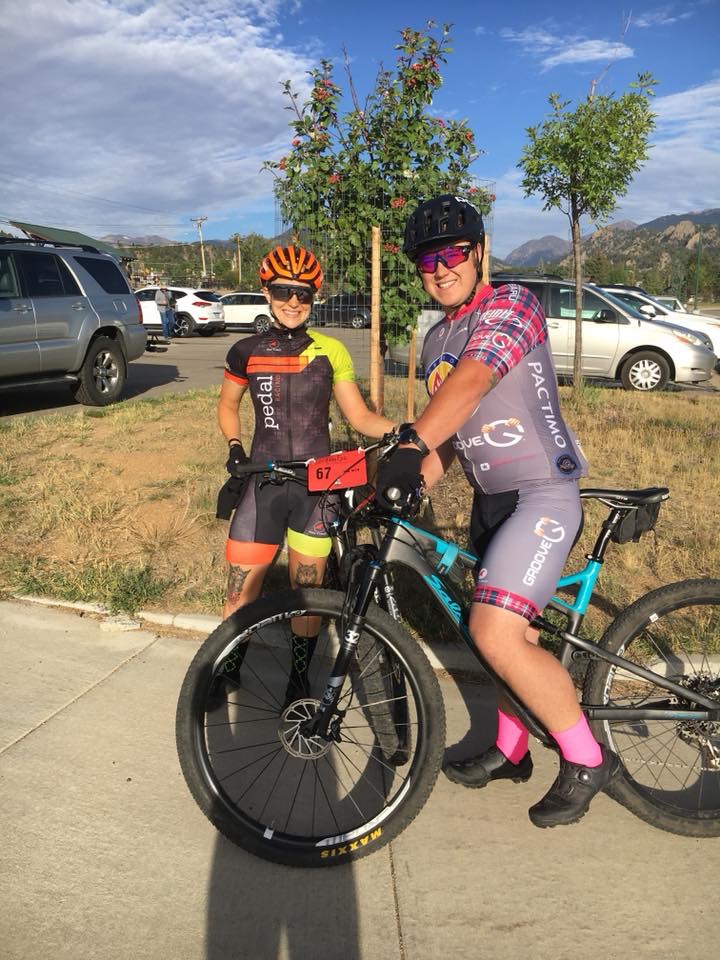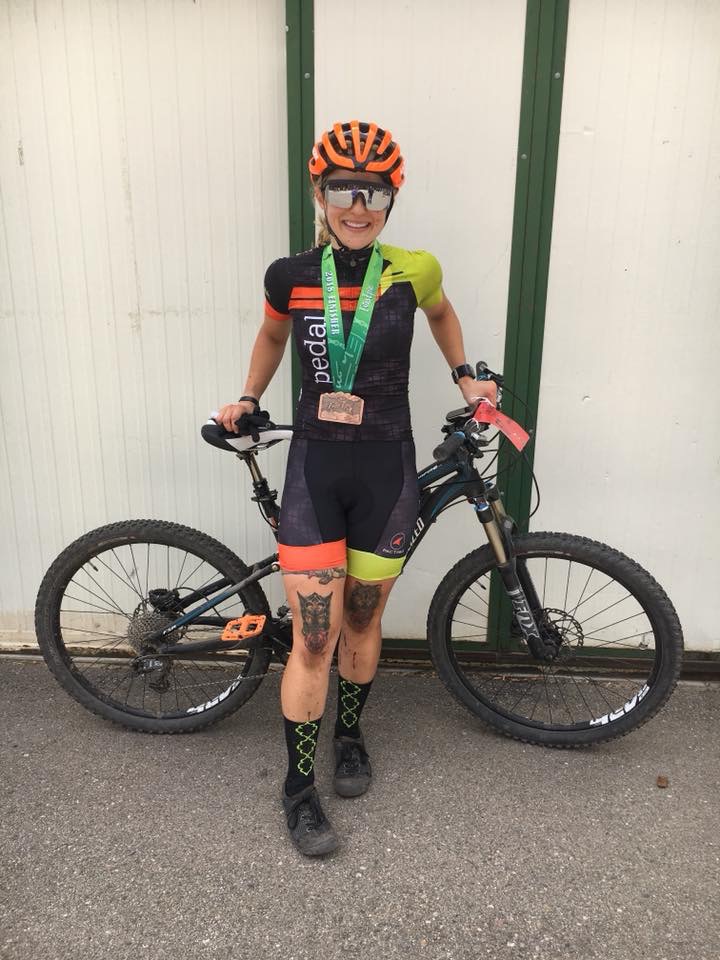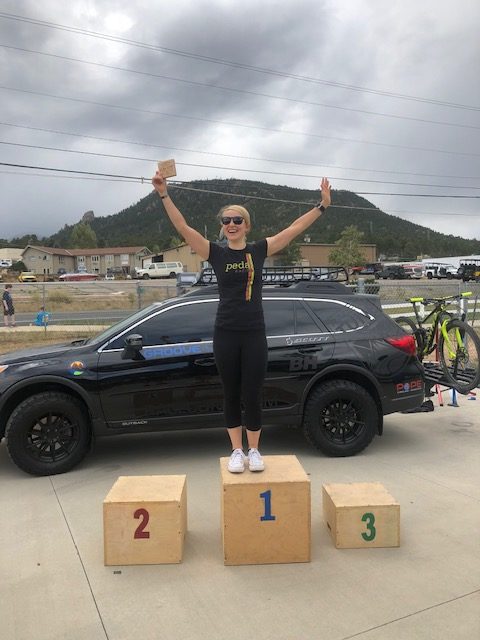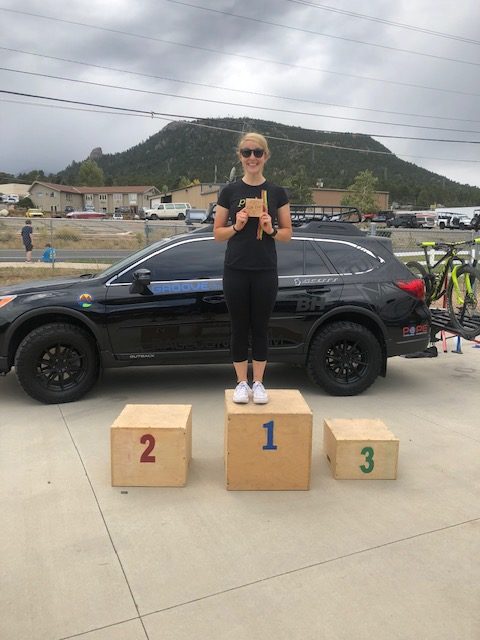To win a bike race, you first gotta show up.
As we corralled in front of the start line at The Estes Epic, I smiled across to my husband, and told a couple of riders, “good luck.” My legs were heavy and so was my mind. Everyone started as a group – I didn’t know who I was competing against. I assumed I was grouped with the 30-year olds since that was my racing age, although I was technically 29. The 30-something’s were a force to reckon with. I knew I had to get in front of them.
I wanted to add to the small number of women who were competing, especially after heated conversations about women’s bike racing. Maybe I wanted an ego boost because I knew not many women participated in the Estes Epic. It’s a 34-mile course with over 5,000 feet in elevation gain. It’s mostly dudes, as I found out. And after completing it, I understood why women weren’t coming out in droves.
Because I didn’t preview the whole course, I didn’t even know what I signed up for.
As we all pedaled out of the parking lot on to the main street, I told myself to keep steady; to stay on Kristi’s wheel. I didn’t have to get in front of anyone just yet. I could save my energy for the climbs.
The group thinned almost instantly as we hit Fish Creek Road. We had 1,000 feet or so of climbing ahead of us in the first 8.5 miles. I was anxious to get in front of people because I knew they’d catch up once we descended.

I kept pace as we winded through switchbacks, constantly pushing on the flat pedals on my 2011, 26’er Specialized mountain bike. I never expected to start racing on the bike when I first bought it. Originally, it was meant to spend more time with my husband and then I raced it at Battle the Bear. I came in first place and I caught the podium bug. And there I was: 7 miles in, tired but determined when my back wheel slipped on out a dusty rock.
Embarrassed, I pulled over to the side and started letting air out of my tires. Kristi passed me and asked if I got a flat. “No,” I said, “just too much air in them.” Other riders were catching up. I looked like an amateur. Hell, I was an amatuer. There was no pretending I was cool. I kept my head pointing down as I mounted the bike.
I couldn’t push back off with my pedals because of the steep incline, so I dismounted my bike, and walked it to the top. I lost Kristi. The one wheel I didn’t want to lose. I knew it was going to happen eventually because I wasn’t fast downhill. I was too scared. Too intimidated.
I often ask myself, “Why am I doing this?” when I don’t feel excited about a race. If I don’t have an answer, I’ll reconsider racing. Several times throughout the season, I just didn’t want to race. Part of me felt ashamed for not having that drive to race, to beat the other women, to land on that top step. The other part of me was nearly relieved I wasn’t racing, and then ashamed because I was relieved.
As I pedaled, I focused on the lines in the dirt and looked for pink, handwritten route signs. The course flattened out enough to catch my breath and give my legs a second to refresh. Often, I’d catch myself looking up at the sky and through the trees – enjoying nature, unlike road races. Maybe that’s why I was enjoying mountain biking so much – being away from cars and pavement.
In the road racing world, there’s an insurmountable pressure to constantly be racing; to earn upgrade points; to be training every waking moment; to be better than the day before. I knew I wasn’t the only one who was exhausted from pinning numbers on my back, waking up before our families, and driving ourselves to far-away races, to warm-up alone, race alone, and drive back home alone.

Mountain bike races were different. People didn’t seem as high strung and I was drawn to it.
I turned the corner and there were several riders walking their bikes up the shale-covered hill. As I swung my leg over my saddle and started walking, I noticed how loose the shale was. It felt like I had rollerskates strapped to my feet as I tiptoed through layers of shale, waiting to give way and wash us all down the mountain.
My heart raced as I quickly tiptoed up higher and higher along the 14% grade hill. I felt an unyielding pressure to be cycling up it, but as I looked ahead and behind me, everyone was off their bike. They were no different than me. There was no shame in walking your bike. Everyone did it.
I wanted to ride over the obstacles, but I didn’t have the skill. I didn’t know how to conquer them. I was too scared to try. Even though dirt is more forgiving than cement, I imagined slamming my face against broken rocks, breaking my neck, and wrapping my body around a tree trunk. I pictured myself paralyzed after a wreck from tumbling from the top of the hill all the way to the bottom, hitting every rock as I catapulted down. My mind has always been my biggest obstacle – bigger than any boulder I’ve faced.
Every section of downhill I encountered, I imagined plummeting to my paralysis. I’d inch up to the lip of the hill and look down. I’d drop my saddle – as if that gave me a new kind of confidence – and level my feet. Tapping the brakes, I’d slowly descend the hill, hoping to make it down alive; constantly reminding myself to trust myself, to trust the bike, and go with the flow. The smaller hills were manageable, but when I reached the 14% grade hill I hiked earlier, I lost all confidence.
I managed to completely freak myself out. I pulled over and out of the way. I wanted to quit. I was exhausted, more mentally than physically because I was constantly on guard for the next obstacle to roll over or avoid altogether. I didn’t want to walk my bike down because it was just as slow as trying to ride it; but constantly pressing on the brakes rattled the bike and my stiff limbs. Any jolty movement of the bike and my legs and arms tensed up. My fingers started to ache from all the braking. Meanwhile, men flew past me, hauling 30 mph as if there weren’t giant boulders their bikes had to clear. How can they do it? I thought.

They were fearless.
They saw over the rocks, the roots, the branches, the 14% descent.
I’ve never been someone to roll with the flow; to let my bike guide me. As a control freak, I wanted to maneuver around obstacles; I didn’t want my bike to lead me through this. I didn’t trust the bike. I didn’t trust myself.
I didn’t think I was good enough to handle the steep descent mixed with giant rocks. I told myself I couldn’t do it, so I didn’t try riding over it. Instead, I stumbled my way down the rocky descent, watching out for mountain bikers with the gull to ride through it all as if they were biking over a smooth road.
As I made my way through uneven paths, shale, and unmarked trails, I had to force myself to keep going. Even if I wanted to quit, we were too deep in the woods for a SAG wagon. I wanted to give up. I started making silly mistakes. I wouldn’t change gears in time and get stuck. Other times, I wouldn’t lean into a turn, stiff from fatigue.
My eyes glanced down at my Garmin every few minutes, watching the mileage remain unchanged. I wanted it to be over. I wanted to cry – to feel something, other than the numbness filling my body and the achy joints in my fingers from gripping the handlebars too tight. Much like how we can’t let things go in life. Gripping too tightly to ideas, beliefs, people, things, only hurts us. My hands ached from death-gripping the handlebars out of a false sense of security; believing that if I only held on tighter it wouldn’t buck me off the saddle; that if I white-knuckled down the mountain, I’d stay safe. Instead, I latched on to the bike and with every bump, my hands pinched tighter.
I was trying to let go, but my insecurities held on. I knew I wasn’t a mountain biker if I couldn’t handle the descents, I thought.
I was running out of water; I had no more gels. Switchback after switchback of loose, sandy dirt, my brakes squealed as mountain bikers flew past me. With every, “on your left,” my self-worth drained. I attached too much of myself to the results of races. Who was I if I wasn’t first?
I was fucking average and I hated it. Average didn’t land pro contracts; it didn’t encourage other teams to seek your talent; my biggest fan was my mom because of course, she’s my mom. If I wasn’t the best, I wanted nothing.

As I turned the corner in the final stretch of the race, I heard Kyle, the Race Director, announce my name among the sea of cheers. A young man placed my finisher’s medal over my crusty hair and dirty cheeks and told me, “congrats!” My family rushed to my side and wrapped their lively arms around my exhausted body.
In mountain biking and in life, you’re constantly faced with obstacles. You can choose to sit there and wait for the obstacle to move itself or you can roll over it. I was awarded first place because I was the only woman in my category. I was quick to disregard my win, but then Kyle leaned over to me and said, “You have to show up to win.” And if I had anything, I had the willingness to show up.
Thanks to my patrons who make my writing possible. You can become part of our club here:
Become a Patron!